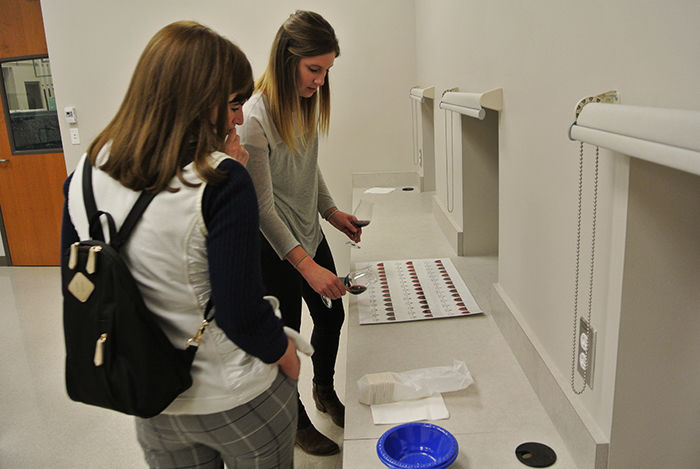WSU Wine analysis lab teaches students to detect flavor flaws
March 9, 2017
Some WSU students this semester are honing their tasting skills in a new wine sensory analysis lab on the Tri-Cities campus.
Caroline Merrell, a WSU food science research assistant, is the instructor of the new lab, called Wine Sensory Evaluation (Food Science 401). Merrell said the course is designed to teach students how to pick up flavors in wine, as well as teach them what those different tastes and aromas mean.
Richard Larsen, research winemaker at WSU, said this type of lab teaches students the basics of what characteristics to look for in wine.
“We’re training them to assess bitterness, astringency and color,” Larsen said. “Those are kind of the basics, and then what we do is we introduce them to different flavors and aromas.”
Merrell said at this point in the semester, she has been mostly working with students on aroma standards. To do this, she put different types of fruit and aromatics, such as coffee, in wine glasses and has her students smell them blindly and guess what they are.
Larsen said that the smells of fresh fruit are not exactly the same as what you get in wine, but it gives students a starting point on what possible flavors they may identify.
Another part of the lab will teach students how to tell if oxygen or bacteria have spoiled a wine, Merrell said. One common wine flaw the course will cover is how to tell when a wine is corked.
Larsen said corked wine has an unpleasant and distinct aroma similar to wet cardboard, and is caused by a compound in some corks called trichloroanisole (TCA). Another common flaw the course covers is when oxygen contaminates wine, which Larsen said can give off flavors of vinegar or nail polish remover.
The course will also show students how to set up sensory evaluations, and the tests and statistics behind the process. She said, however, the lab is mostly about how to taste wine and the origin and manipulation of flavors.
“Mainly, the whole point of the class is how to taste wine and where all the tastes and smells come from, and how we can change them,” Merrell said.
This lab is something that the viticulture and enology program wanted on the Tri-Cities campus for a while, so Merrell volunteered to teach it, she said.
Tom Collins, a WSU assistant professor in the viticulture and enology program, along with Associate Professor of Enology, Jim Harbertson, helped Merrell put the lab together. However, Collins said Merrell did most of the heavy lifting.
“She’s done the bulk of the work,” Collins said. “We just looked at the syllabus and gave her some suggestions about things that could be included or weren’t especially required.”
Merrell said she enjoys teaching the lab and is considering pursuing a future in academia as a professor.
“I mean, it’s a fun subject matter,” she said. “When students are enjoying what they’re doing, it’s pretty easy to teach, so teaching a class on how to taste wine is a pretty easy way to start teaching.”










